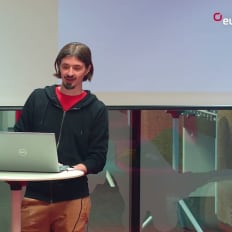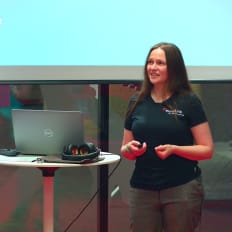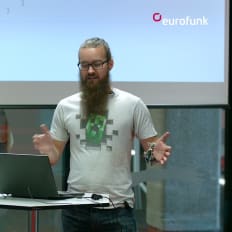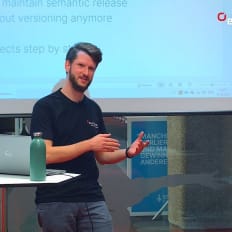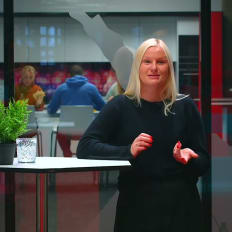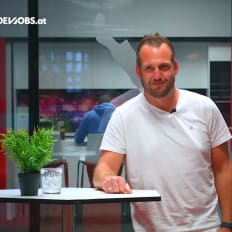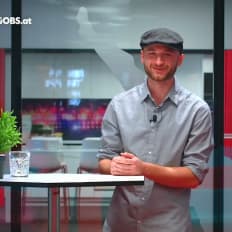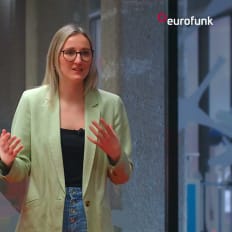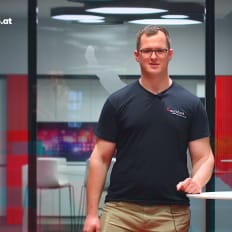
eurofunk Kappacher GmbH
Maximilian Spiesmaier, IT Security Consultant bei eurofunk Kappacher
Description
Maximilian Spiesmaier von eurofunk Kappacher teilt im Interview seine Erfahrungen aus der IT Security, welche Herausforderungen er im Arbeitsalltag meistert und wie man am besten in den Beruf startet.
By playing the video, you agree to data transfer to YouTube and acknowledge the privacy policy.
Video Summary
In "Maximilian Spiesmaier, IT Security Consultant bei eurofunk Kappacher," Speaker Maximilian Spiesmaier recounts moving from playful computer tinkering in high school to studying Secure Information Systems in Hagenberg, working in security consulting, and now securing eurofunk’s highly customized control center solutions to meet legal and international security standards. He values the meaningful impact: these systems help people get rescued faster and avoid escalating problems. His advice for newcomers: a degree isn’t required—curiosity, hands-on experimentation, and, if you lack formal training, starting with security certifications are key.
From Tinkering to Trust: Maximilian Spiesmaier’s Path to Securing Leitstellen Solutions at eurofunk Kappacher
Context: A security career powered by curiosity and purpose
In the session “Maximilian Spiesmaier, IT Security Consultant bei eurofunk Kappacher,” speaker Maximilian Spiesmaier from eurofunk Kappacher GmbH shares how playful curiosity became a profession with real impact. His message is refreshingly direct: you don’t necessarily need a degree, but you do need drive. Bring a willingness to click through, try things, and keep following a path once you’ve found it. Today, his responsibility is to ensure the highly individualized Leitstellen solutions his company delivers meet legal requirements, comply with international security standards, and are not attackable.
“You don’t have to have studied it. What you need is a strong drive to click through, to try things, and to enjoy playing around.”
We at DevJobs.at often hear about “jobs with meaning.” In this session, meaning isn’t an abstract slogan. Spiesmaier explains why his work genuinely matters: the Leitstellen solutions he helps secure enable people to be rescued faster—or avoid getting into bigger trouble—when they call. Security here isn’t a trophy; it’s part of a chain that makes a tangible difference.
A playful start: from gamer to system explorer
The story begins in high school. Spiesmaier describes how an interest in computer games grew into something deeper: a desire to understand and shape what happens behind the scenes—permissions, folders, installations.
He “discovered what you can actually do on a computer if you know your way around a bit”: getting into folders “you’re not supposed to get into,” installing things “you’re not supposed to install.”
This isn’t a blueprint for breaking rules. It’s a candid description of what fuels many technical careers: an exploratory start. To understand security, you need to see how systems respond at their edges—and where those edges are. Clicking, trying, failing, trying again: the “playing around” becomes a path to understanding how digital systems behave.
Why that beginning matters
- It trains systematic experimentation and observation.
- It builds intuition for boundary zones—where permissions, processes, and technology meet.
- It creates intrinsic motivation: learning becomes its own reward.
The takeaway for aspiring practitioners is unmistakable: curiosity isn’t a detour; it’s the direct route.
Studying in Hagenberg: turning curiosity into a discipline
Spiesmaier chose to professionalize his curiosity. He studied “sichere Informationssysteme” (secure information systems) in Hagenberg. The program gives his hands-on instincts a structured frame. Exploration finds a shared language of concepts, methods, and standards.
Crucially, while he took this path, he downplays its necessity. A degree can help, but it’s not mandatory. His real criterion is mindset: drive, clicking through, trying things.
What this step teaches
- Formalization amplifies existing skills; it doesn’t replace them.
- Theory and practice complement each other: curiosity drives, study channels.
- A degree is a tool—those without one can use security certifications as an alternative.
First professional chapter: starting with an IT security consultancy
After studying, Spiesmaier began “bei einem Berater für IT Security.” That transition anchors his knowledge in real demands and constraints. These moments often test whether curiosity, method, and responsibility can entwine. For Spiesmaier, they did—and set him up for his current role, where security translates into measurable benefit.
Today as an IT Security Consultant at eurofunk Kappacher: securing highly individualized Leitstellen solutions
He now “manages and secures Leitstellen” at eurofunk. His job, in his words: make the “highly individualized Leitstellen solutions” that eurofunk Kappacher delivers secure according to legal requirements, aligned with “international standards for security,” and “not attackable.”
That distills security work into three axes:
- Satisfy legal requirements.
- Comply with international standards.
- Reduce and harden against attack surfaces.
Individualized solutions, elevated responsibility
Individualized systems are bespoke. For security, that means moving beyond generic setups to understand risk in the specific context of each solution. Day to day, the work is about balancing requirements, adapting safeguards, and validating effectiveness—so systems remain robust and the people who rely on them can count on them.
“Jobs with meaning”: security that reaches people
What does he like most? That eurofunk offers “Jobs mit Sinn”—jobs with meaning. The reason is concrete: “Through our Leitstellen solutions, people can be rescued faster—or not end up in bigger trouble—when they call.”
“You just have a good feeling when you’re helping people, even indirectly.”
This reveals why security is more than hygiene. Security supports processes that matter when it counts. When Leitstellen solutions operate reliably and are protected from attacks, they strengthen the chain that leads to real help. For Spiesmaier, this isn’t just a professional mission—it’s personal motivation.
Learning stance over formal mandate: “You don’t have to have studied it”
Perhaps his most striking advice: a degree isn’t required. The critical ingredient is internal drive.
“What you need is a strong drive to click through, to try things, and to enjoy playing around.”
Security lives in motion. New systems, new attack vectors, new standards—staying effective means staying curious. Spiesmaier’s message is encouraging: with that mindset, you can work your way forward.
Certifications as a bridge
He adds: “At the beginning, you might consider security certifications if you don’t have the educational background.” Certifications don’t replace experience, but they bring structure, motivation, and a common vocabulary—a starting point to learn systematically and signal seriousness.
Principles distilled from practice
From Spiesmaier’s path, several principles emerge—familiar across tech careers, but voiced here with particular clarity:
- Follow curiosity: the playful start is a strength, not a flaw.
- Structure what works: degrees or certifications can turn curiosity into durable competence.
- Context matters: highly individualized solutions demand tailored security.
- Laws and standards are coordinates: they guide without removing responsibility.
- Impact motivates: when secured Leitstellen solutions help people faster, meaning becomes a real anchor.
Actionable steps for newcomers to security
Spiesmaier’s advice translates neatly into practical moves:
- Find what sparks your curiosity.
- Click through systems intentionally. Notice how permissions behave and where boundaries sit.
- When something fails, analyze why—not just how to fix it.
- Document your path.
- Capture the steps you took; revisit them—deeper, more precisely, more reflectively.
- Build transferable knowledge by repeating and refining experiments.
- Choose a frame—degree or certifications.
- If you lack a formal background, “consider security certifications” early on.
- Use that structure to solidify fundamentals and vocabulary.
- Learn to read context.
- Don’t copy-paste solutions. What’s safe in one environment may be risky in another.
- Practice thinking in terms of legal requirements and standards alongside technical details.
- Seek work with impact.
- Ask whether the outcomes motivate you. Spiesmaier highlights how fulfilling it is when solutions genuinely help people.
- Keep the joy of tinkering alive.
- Build routines for continuous exploration. What you can’t explore with curiosity is hard to secure for long.
What “highly individualized” means for security
When Spiesmaier talks about “hochindividuelle Leitstellenlösungen,” it points to a core tension: standardization builds efficiency; individualization builds fit. Security has to reconcile both.
- Bespoke systems require bespoke protection: generic checklists won’t cut it alone.
- Legal requirements and international standards are guardrails, not templates.
- “Not attackable” is an aspiration that demands ongoing care—updates, checks, and adjustments.
This grounds security in day-to-day reality: not a one-off project but a continuing responsibility.
Motivation through impact: why “meaning” matters
Spiesmaier doesn’t just claim his job has meaning; he shows it by explaining how their solutions help people get rescued faster “when they call.” It’s a plain statement that refocuses the work on results, not tools. As a career compass, that matters: knowing who benefits from your work sustains motivation and sharpens priorities.
What we learned editorially
- Meaning is a criterion, not a bonus: it clarifies decisions.
- Responsibility grows with proximity to outcomes: seeing the effects of your work encourages more careful security decisions.
- Clear language helps: simple statements (“rescued faster”) explain security’s importance better than abstractions.
Continuity as a career factor: follow the path you discover
One line lingers: “Once you’ve discovered a path, keep going—work your way forward.” It sounds simple, but it’s the essence of depth.
- Discoveries don’t have to be spectacular. What matters is pursuing them.
- The second, third, and fourth pass over the same topic turns beginners into professionals.
- Security is built through repetition, reflection, and attention to nuance.
For leaders and teams: how to cultivate this mindset
Even though Spiesmaier speaks about his personal journey, teams can draw guidance from it:
- Allow room to explore: valuing “playing around” fosters genuine security skill.
- Rate learning paths, not just outputs: assess how decisions were made.
- Support formal steps: certifications can help—especially for career changers.
- Translate standards into context: teach how requirements apply to a specific system.
A realistic picture of IT security
This session avoids glamour and offers something more useful: security is the fusion of curiosity, structure, and responsibility. It rewards exploration, can benefit from formalization, and finds its strongest purpose where solutions help people—in this case, in the Leitstellen solutions by eurofunk Kappacher GmbH.
“My task is to make the highly individualized Leitstellen solutions we deliver secure in accordance with legal requirements, to ensure they meet international standards for security, and that they are not attackable.”
That line frames Maximilian Spiesmaier’s entire journey: from playful explorer to responsible security consultant protecting systems so people can get help.
Takeaways for developers and security-minded engineers
- Curiosity is your edge. Use it deliberately.
- Structure your learning—through a degree or certifications.
- Think security in context: individualized, legally aligned, standards-driven.
- Seek impact: work that helps sustains motivation.
- Stay on the path: repetition, depth, and follow-through make the difference.
Closing: A path that stays open
Maximilian Spiesmaier’s trajectory shows how a playful start can evolve into responsibility and purpose. For us at DevJobs.at, the enduring impression is a stance that works: explore, refine, persist—and keep the human impact in view. In “Maximilian Spiesmaier, IT Security Consultant bei eurofunk Kappacher,” that stance comes to life. Embrace it, and IT security becomes more than a job—it becomes a mission.
More Tech Talks
eurofunk Kappacher GmbH Cypress Component Tests
Patrick Pichler von eurofunk Kappacher demonstriert in seinem devjobs.at TechTalk die Herangehensweise des Teams, wie sie Component Tests mit cypress durchführen.
Watch noweurofunk Kappacher GmbH From Sound to Sense
Sabine Hasenleithner von eurofunk Kappacher spricht in ihrem devjobs.at TechTalk über die technischen Hintergründe von Sprach Erkennung im Notruf Kontext und zeigt in einer Live Demo eine mögliche Implementierung.
Watch noweurofunk Kappacher GmbH Application Load Testing with k6
Daniel Knittl-Frank von eurofunk Kappacher spricht in seinem devjobs.at TechTalk darüber, wie die hohen Performance Anforderungen der im Unternehmen entwickelten Software erfüllt werden.
Watch noweurofunk Kappacher GmbH Effortless Versioning
Stefan Höller von eurofunk Kappacher zeigt in seinem devjobs.at TechTalk, wie das Unternehmen die Versionsverwaltung bei langen Produktzyklen mithilfe von Semantic Release gestaltet hat.
Watch now
More Tech Lead Stories
eurofunk Kappacher GmbH Johanna Blum, Release Train Engineer bei eurofunk Kappacher
Johanna Blum von eurofunk Kappacher beleuchtet im Interview die Teamkultur, die wichtigsten Technologien im Einsatz und die Besonderheiten des Recruiting-Prozesses.
Watch noweurofunk Kappacher GmbH Thomas Ronacher, Head of Technical Support bei eurofunk Kappacher
Thomas Ronacher von eurofunk Kappacher spricht im Interview über die Struktur des Teams, die verwendeten Technologien und wie der Bewerbungs- und Onboardingprozess abläuft.
Watch now
More Dev Stories
eurofunk Kappacher GmbH Valentin Zintl, Junior Development Engineer bei eurofunk Kappacher
Valentin Zintl von eurofunk Kappacher erzählt im Interview über seinen Karriereweg, welche Aufgaben ihn täglich erwarten und welche Fähigkeiten besonders für den Einstieg wichtig sind.
Watch noweurofunk Kappacher GmbH Viktoria Haselsteiner, Scrum Master bei eurofunk Kappacher
Viktoria Haselsteiner von eurofunk Kappacher spricht im Interview über ihren Einstieg in die Welt von Scrum, welche Fähigkeiten sie dabei als besonders hilfreich erlebt hat und worauf es ihrer Meinung nach in der täglichen Arbeit wirklich ankommt.
Watch noweurofunk Kappacher GmbH Johannes Festi, Trainee Software Development bei eurofunk Kappacher
Johannes Festi von eurofunk Kappacher gibt im Interview Einblicke in den Arbeitsalltag als Software Development Trainee, wie er dazu gekommen ist und was seiner Ansicht nach wichtig für den Einstieg ist.
Watch now

